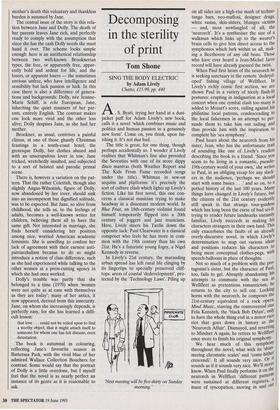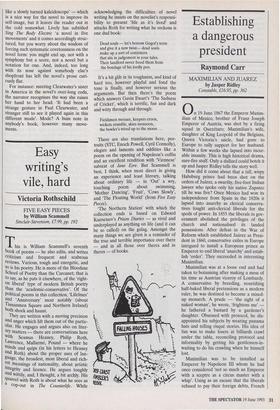Decomposing in the sterility of print
Tom Shone
SING THE BODY ELECTRIC by Adam Lively Chatto, £15.99, pp. 440 A. S. Byatt, trying her hand at a dust- jacket puff for Adam Lively's new book, calls it a novel 'which combines music and politics and human passion in a genuinely new form'. Come on, you think, upon fin- ishing it. It's not that bad.
The title is great, for one thing, though perhaps accidentally so. I wonder if Lively realises that Whitman's line also provided the Seventies with one of its more dippy disco mantras (both Weather Report and The Kids From Fame recorded songs under the title). Whitman in sew-on sequins and platforms: it's precisely the sort of culture clash which lights up Lively's fiction. Like his first novel, this one con- cerns a classical musician trying to make headway in a dissonant modern world. In Blue Fruit, an 18th-century violinist found himself temporarily flipped into a 20th century of joggers and jazz musicians. Here, Lively steers his Tardis down the opposite tack: Paul Clearwater is a classical composer who feels he has more in com- mon with the 19th century than his own 21st. He's a futuristic young fogey, a Nigel Kennedy in reverse.
In Lively's 21st century, the marauding urban spread has left rural life clinging by its fingertips to specially preserved cliff- tops: areas of coastal 'dedevelopment', pro- tected by the 'Technology Laws'. Piling up Next meeting will be five-thirty on Sunday morning.' on all sides are a high-rise mash of techno- tango bars, neo-mafiosi, designer drugs, white rastas, skin-sisters, bhangra victims — and, most newfangled of all, the `neurorch'. It's a synthesiser the size of a walkman which links up to the wearer's brain cells to give him direct access to the symphonies which lurk within us all, mak- ing a Beethoven of any old bozo. Those who have ever heard a Jean-Michel Jarre record will have already guessed the twist. When Paul first hears of the neurorch he is seeking sanctuary in the remote 'dedevel- oped' fishing village of Wellfleet. In Lively's richly comic first section, we are shown Paul in a variety of nicely flash-lit postures: erupting in indignation at a local concert when one cymbal clash too many is added to Mozart's score, railing against his philistine local patrons, condescending to the local fishermen in an attempt to per- suade them to take him out sailing and thus provide him with the inspiration to complete his 'sea symphony'. Paul hears about the neurorch from his sister, Jean, who has the unfortunate trait of sounding like one of Lively's readers describing the book to a friend. 'Since you seem to be living in a romantic, pseudo- 19th-century world of your own,' she writes to Paul, in an obliging recap for any slack- ers in the audience, 'perhaps we should start with some basics . . and so on, to a potted history of the last 100 years. Many things have changed in Lively's future, but the citizens of the 21st century evidentlY still speak in that strange tour-guidese which has long been the curse of bad sci-fi: trying to render future landmarks instantly familiar, Lively succeeds in making his characters strangers in their own land. This only exacerbates the faults of an already overly-discursive novel, in which Lively's determination to map out various ideas and positions reduces his characters to being mere conceptual clothes-pegs, with speech-balloons in place of thoughts.
Not so much of a problem with the pro- tagonist's sister, but the character of Paul, too, fails to gel. Abruptly abandoning his attempts to commune with the sea in Wellfleet as pretentious romanticism, he returns to the city to sell out. Locking horns with the neurorch, he composes the 21st-century equivalent of a rock operas Mind Music, starring the controversial star Fela Kanuteh, the 'black Bob Dylan', onlY to have the whole thing end in a minor race riot that goes down in history as the `Neurorch Affair'. Dismayed, and reverting to Mindset A again, he retires to Wellfleet once more to finish his original symphony. We hear much of this symphony throughout the novel, what with its 'shu" mering chromatic scales' and 'come-hither crescendi'. It all sounds very nice. Or it sounds as if it sounds very nice. We'll never know. When Paul finally performs it on the neurorch in Wellfleet 'different patterns were sustained at different registers, maze of syncopation, moving in and out like a slowly turned kaleidoscope' — which is a nice way for the novel to improve its self-image, but it leaves the reader out in the cold somewhat. Lively has subtitled Sing The Body Electric 'a novel in five movements' and it comes accordingly struc- tured, but you worry about the wisdom of forcing such systematic covetousness on the novel form: you might end up, not with a symphony but a score, not a novel but a notation for one. And, indeed, too long with its nose against somebody else's shopfront has left the novel's prose curi- ously flat.
For instance: meeting Clearwater's sister in America in the novel's over-long coda, the narrator recognises the way she raises her hand to her head. 'It had been a strange gesture in Paul Clearwater, and stranger still to see it played again in this different mode'. Mode? A bum note in anybody's book, however many move- ments.



















































 Previous page
Previous page